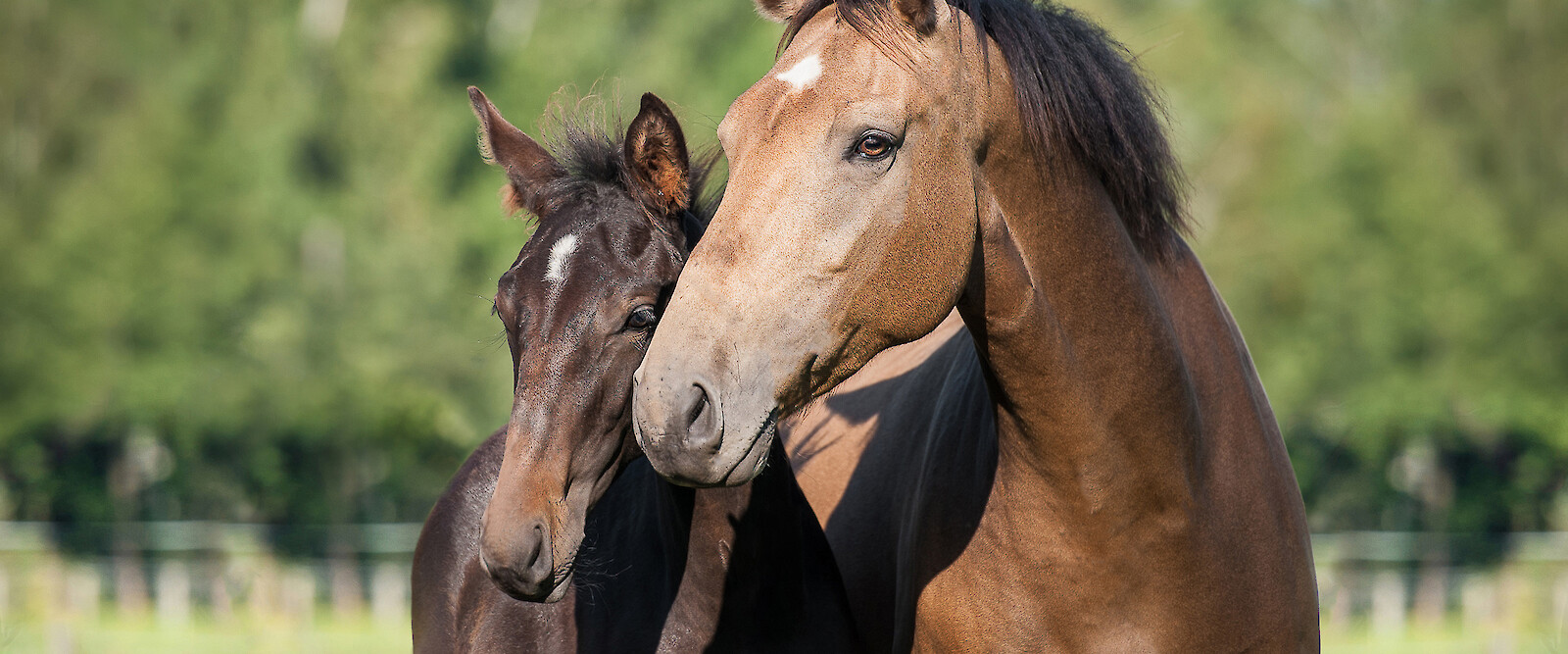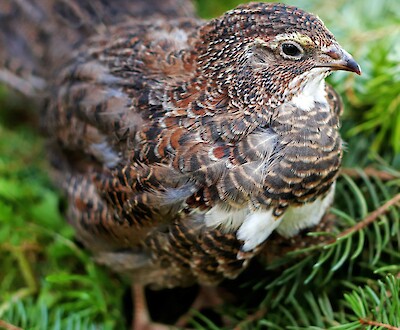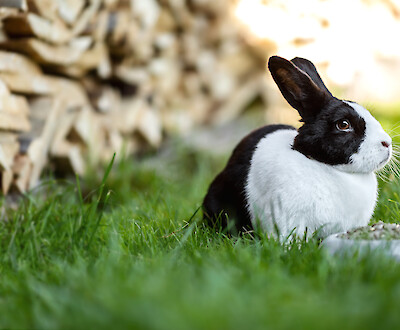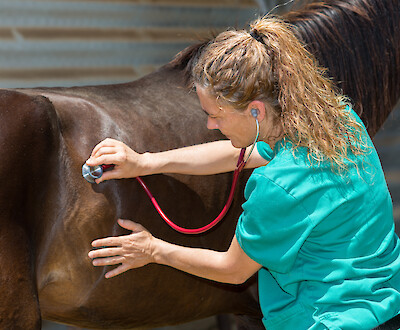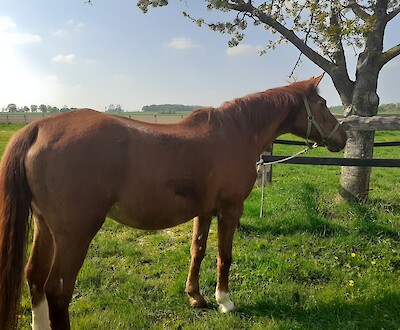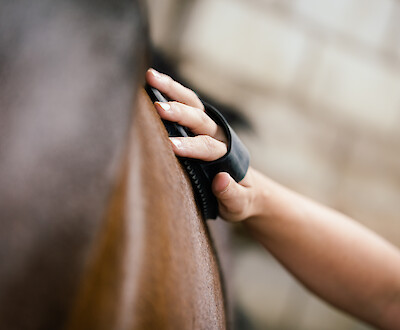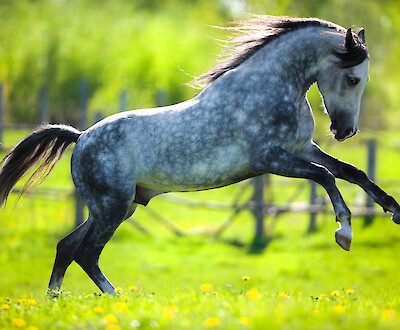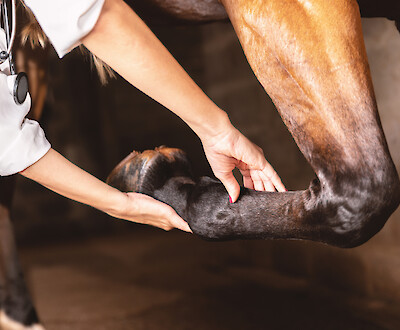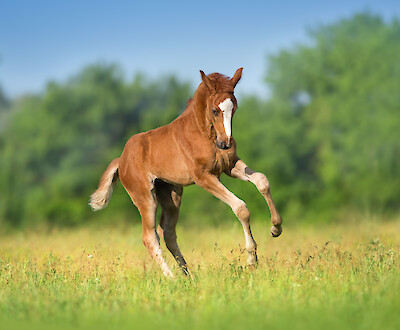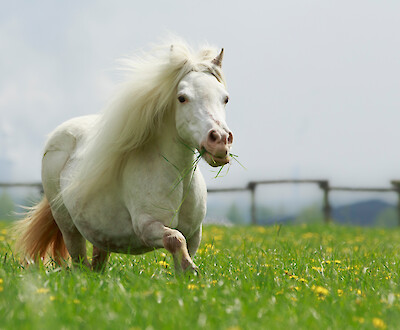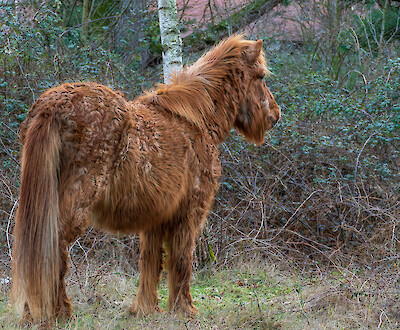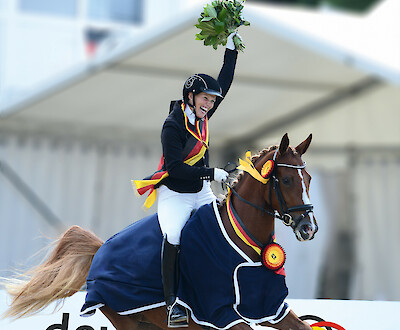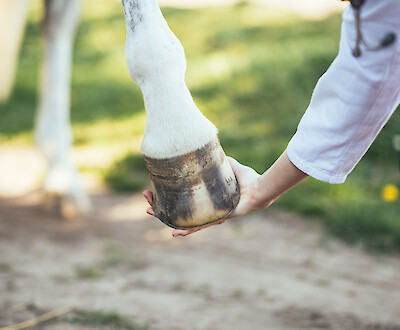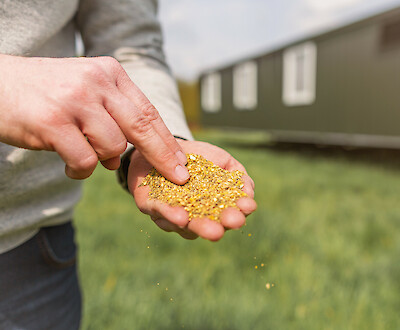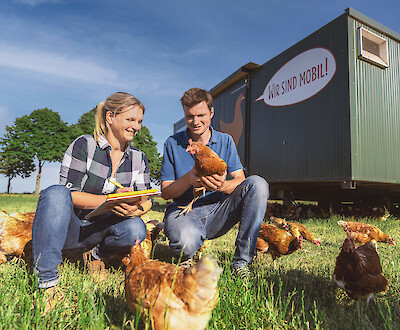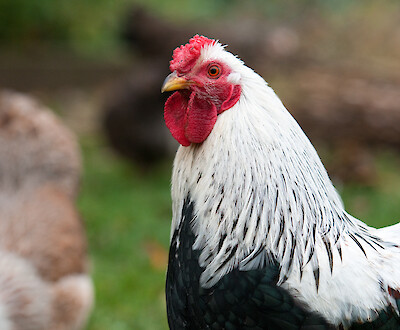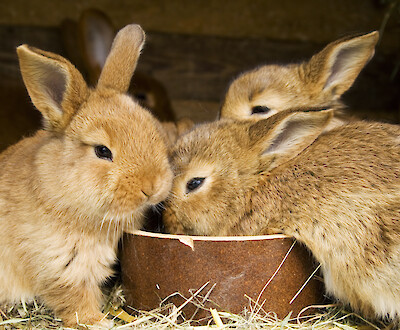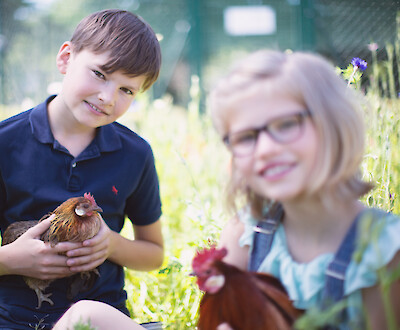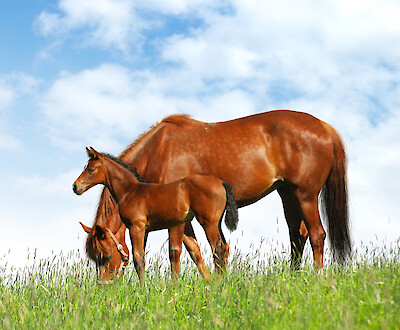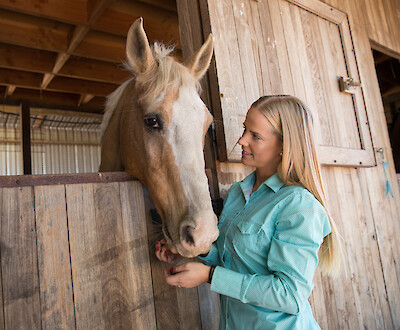Interview on the appropriate feeding of weaners
"After weaning, foals cannot compensate for the loss of breast milk with roughage alone."
Weaning is an important experience in the life of a foal. In addition to the separation from the mare, weaning is usually associated with a move to a new stable, coupled with getting to know and fitting into a new group of young horses of the same age. Feed intake also changes significantly. With weaning and the discontinuation of the mother's milk, foals eat only solid food. This all causes stress and should therefore be well prepared. We spoke to feeding expert Barbara Wefers from deukavallo about how horse owners can make weaning as pleasant and stress-free as possible for their foals and how appropriate feeding can support them.
When are foals weaned from the mare?
Wefers: "Usually foals are weaned from the mare at the age of five to six months. This is an average value, after all, weaning depends on the physical development of the foal. Only when the stomach and intestines have developed sufficiently and the foal can take in appreciable amounts of crèche feed, should the complete switch to solid food take place."
Can foals be weaned too early (e.g. after three months)?
Wefers: "Absolutely! In order for foals to be able to compensate for the absence of mother's milk, they must be able to digest solid food sufficiently. For this, the stomach and intestines of the young horses must be sufficiently developed. This is usually the case after the foal has reached the age of 4 months. It is better not to wean foals before then!"
In which months are foals usually weaned?
Wefers: "That always depends: Most foals are born in April and May - some stragglers also in June. Therefore, weaning usually takes place in October and November
When are foals called weanlings?
Wefers: "Foals are called weanlings during the first half of winter. This phase begins on the day they leave the mare, move to another stable and eat only solid food. From the following turn of the year, they are already called 'yearlings' - regardless of when exactly they were born and when weaning took place."
How stressful is weaning for foals?
Wefers: "Weaning is a serious break in the foal's life. As important as weaning is for the further development, the experience is stressful and emotionally formative for foal and mare. One must always keep in mind: Until weaning, the foal is in almost constant contact with its mother. This creates a close emotional bond. At weaning, this bond is then - usually abruptly - cut. That is why weaning requires planning and a lot of care on the part of the owner
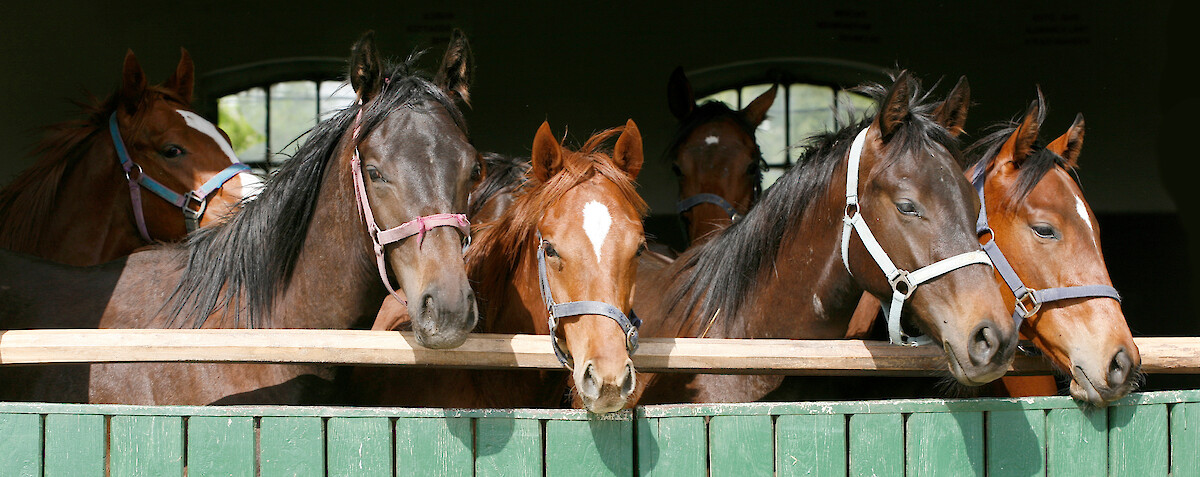
How can the stress at weaning of the foal be reduced?
Wefers: "Unfortunately there is no patent remedy. Ultimately, every horse owner must decide for themselves how they want to wean the foal. In order to avoid unnecessary stress, it has proven effective to separate foal and mare gradually over a period of several weeks for longer and longer periods of time
How do wild horses wean their foals?
Wefers: "In the wild, weaning is usually slower and more gradual than in domestic horses. Since mares continue to give milk until the next foal is born, foals in the wild take in mother's milk over a longer period of time than their relatives in stables. As the milk yield of the pregnant mare decreases, the young horses then take in more and more solid food. However, it is not at all uncommon for free-living foals to continue to take in mare's milk - even if only in small quantities - into their second year of life."
Why is weaning important for foal and mare?
Wefers: "Foals grow rapidly in the first months of life: In the first year of life, they already grow to almost 60 percent of their later size. In this phase of intensive development and manifold changes, the course is set for the further physical, emotional and social development of the horse. Especially at this time it is important that they come into contact with other horses of the same age. Only in this way can they acquire social competence and find their place in the herd. Foals that are weaned in an exemplary manner are later both physically and mentally healthier than conspecifics that have had less or later contact with conspecifics of the same age. Deficits can only be made up for later with difficulty or not at all.
But weaning is also important and significant for the mare. Raising the foal takes energy and lactation drains the substance. Mares need a time of rest and regeneration; especially if they are to become pregnant again, or if they are pregnant before they are to enter the
Can bad or wrong weaning make the foal sick?
Wefers: "Absolutely! The foal experiences weaning as a stressful phase characterised by fear of loss. The absence of the mother mare, the change to another stable and the encounter with new mates. All this can unsettle the foal - restlessness, loss of appetite and even diarrhoea are possible consequences. Scientific studies have shown that foals can also have stomach problems during this time. After careful familiarisation with the unfamiliar environment and integration into the new herd, the acute problems should improve again."
What nutrients do foals need after weaning?
Wefers: "Mare's milk is rich in important nutrients. For rapid growth, the foal needs sufficient energy and high-quality protein. When they talk about high-quality proteins, animal nutritionists always mean the supply of all important amino acids - the building blocks that make up protein. These include lysine, methionine, cysteine and threonine. Horses need them to build muscles, bones and tendons. Especially in the first year of life, the protein requirement is high. For this reason, the protein content in rearing feeds for weanlings (e.g deukavallo Breeding Muesli) is correspondingly high

What are the consequences of a nutrient deficiency on foals or weanlings?
Wefers: "It is difficult to give a general answer. The deficiency of each nutrient manifests itself differently. For example, a vitamin A deficiency is usually recognised by a weak immune system, an undersupply of zinc, on the other hand, by the development of foal warts, mallenders, infections or disturbances in wound healing.
One must also distinguish between an acute, short-term deficiency and a long-term and persistent undersupply. Watery stools, colic or stomach ulcers can be caused in the short term by feeding errors. Joint and tendon problems as well as brittle bones are usually consequences of a persistent deficiency. In case of doubt, horse owners should consult their veterinarian or feeding expert
What about vitamins and trace elements? Are they important too?
Wefers: "Of course. Overall, the foal's need for vitamins, trace elements and other nutrients is significantly higher than that of adult horses. Especially as they can only absorb smaller amounts of feed due to their growth and therefore need nutrient-concentrated feed.
An important reason: foals grow quickly in their first year of life. In order for the skeleton to develop properly, the young horses need sufficient vitamin D. Since the "sun vitamin" is connected with bone formation, a vitamin D deficiency can lead to developmental damage in the musculoskeletal system. An undersupply of calcium, phosphorus, copper or manganese also has a negative effect on development. A suitable concentrate (e.g deukavallo Breeding Muesli) should therefore have an appropriate nutrient composition."
Do foals need concentrated feed after weaning?
Wefers: "Absolutely! Foals cannot compensate for the loss of nutrient-rich mother's milk with roughage alone. This is even more true in autumn, when the foal only has hay and straw available. A nutrient deficiency and associated developmental problems would be an inevitable consequence.
A targeted, needs-based administration of concentrates adapted to the breeding ensures that the foal is supplied with all important nutrients. This lays the foundation for a species-appropriate development. Oat-based concentrates have proven particularly effective (e.g deukavallo Breeding Muesli).
In spring, when foals have completed their first year of life, they can cover a large part of their requirements with lush, juicy and nutrient-rich pasture grass. From this point on, special breeding feeds can be phased out of daily feeding and horse owners* can switch to a basic manger feed or mineral feed."
Image sources: © Rita Kochmarjova - stock.adobe.com (top slider) / © acceptfoto - stock.adobe.com
Contact person

Barbara Wefers
Contact person

